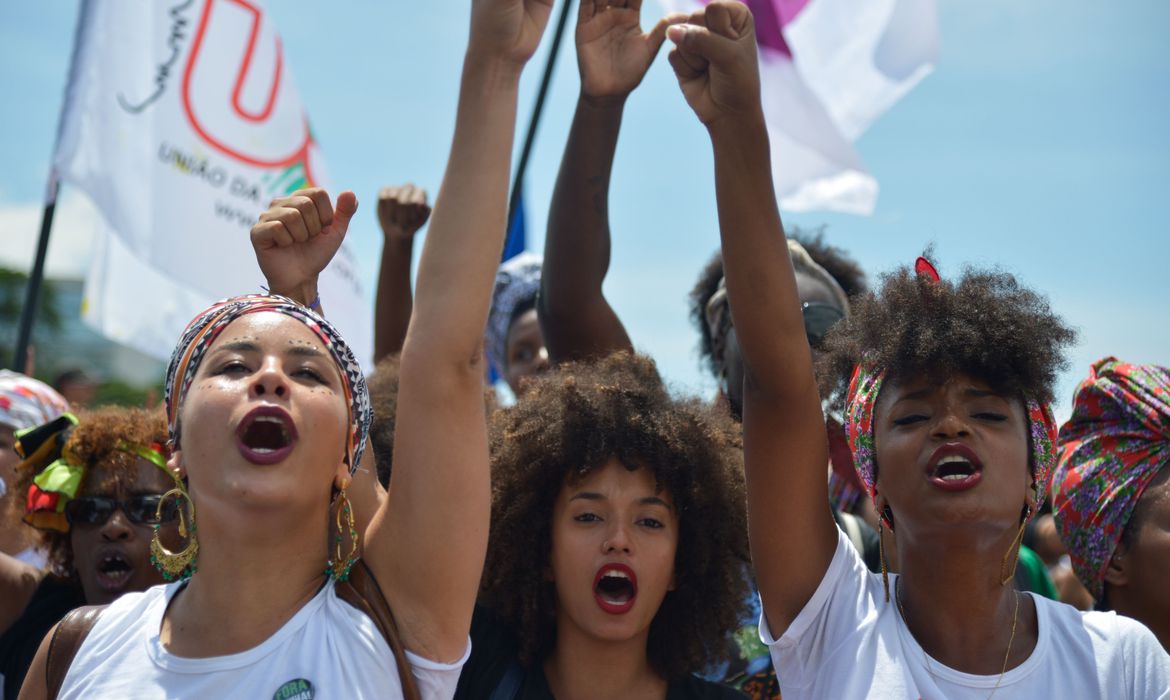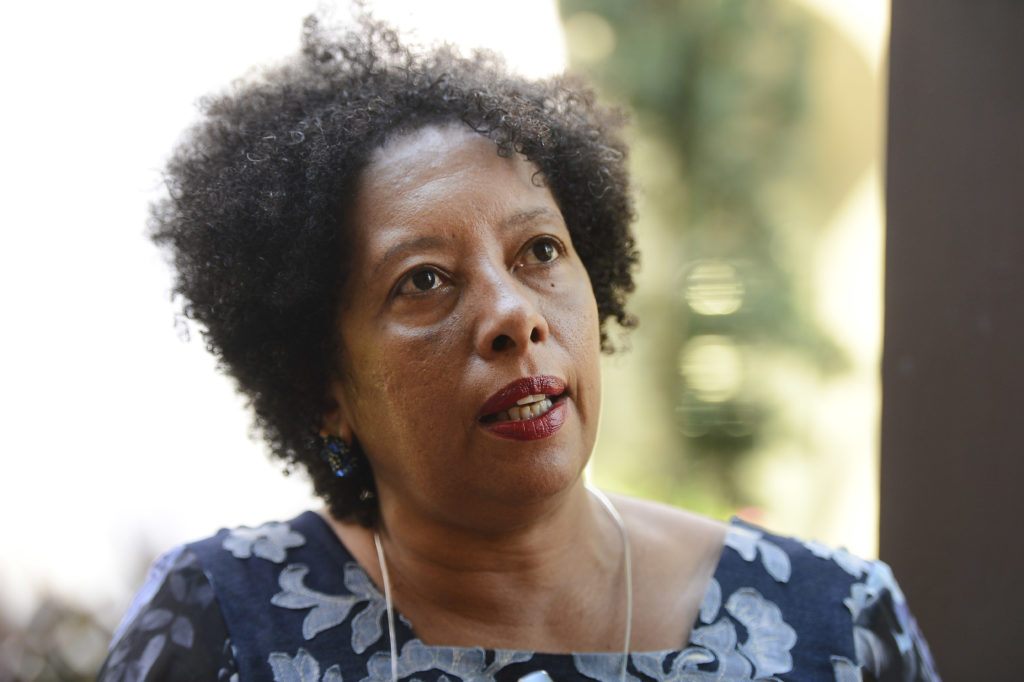The legacy of the Durban Conference for Brazil
With broad Brazilian participation, the UN meeting held 20 years ago in South Africa drove the creation of public policies to tackle racism
 Quando ativistas negras e negros lutam por políticas públicas antirracistas, o objetivo não é estabelecer privilégios para esta população, mas criar formas de reduzir a desigualdade entre brancos e negros. Foto: Marcello Casal Jr/Agência Brasil
Quando ativistas negras e negros lutam por políticas públicas antirracistas, o objetivo não é estabelecer privilégios para esta população, mas criar formas de reduzir a desigualdade entre brancos e negros. Foto: Marcello Casal Jr/Agência Brasil
“There’s no shortage of work to be done. It’s time to roll up our sleeves and get stuck in,” wrote the historian and activist Wania Sant’Anna, in September 2001, in the newsletter of the CNDM (National Council on Women’s Rights). It was a call to action shortly after the end of the 3rd United Nations World Conference against Racism, Racial Discrimination, Xenophobia and Related Intolerance, held in the same month in Durban, South Africa.
Two decades later, in 2021, Sant’Anna believes that the hard work of confronting racism, motivated by Durban, has produced important results, especially the achievements of state mechanisms to reduce the imbalances between whites and blacks in Brazil. However, the path to racial equality is still long and arduous.
“In Durban, we reaffirmed that confronting racism is a matter of human rights. We also managed to make very clear the fundamental role of the State in this confrontation,” the historian told Conectas. She is one of more than 400 people who served on the Brazilian delegation; the largest among the 173 participating countries. Today, she is vice president of the Board of Trustees of IBASE (Brazilian Institute of Social and Economic Analysis).
Prominence of black women
With a strong presence by black women in civil society organizations, governments and research centers, the Brazilian delegation had a major influence on the conference’s discussions. This was because, even before arriving in South Africa, the Brazilians were already actively working on local and regional discussions that occurred at the global event in 2001.
In the book Brazil and Durban – 20 years later, recently published by Geledés – Black Woman’s Institute, Sueli Carneiro states that, despite the tensions and polarizations at the conference, the “Afro-Descendants of the Americas and Afro-Brazilians in particular have much to commemorate for what Durban ratified of the achievements from the Regional Conference of the Americas, incorporating several paragraphs agreed by the American States in Santiago, Chile” in 2000. The Chilean conference was the preparatory event for the Americas ahead of Durban.
Therefore, Geledés, Criola, Cfemea and the Brazilian Coalition of Women are some of the organizations that played a key role in the discussion and decision-making processes. Moreover, the Brazilian Edna Roland, a black woman and activist, was the Rapporteur of the 3rd World Conference against Racism.]

The historian and activist Wania Santanna. Photo: Tânia Rêgo/Agência Brasil
The legacy of Durban for Brazil
According to Sant’Anna, the final document from Durban, signed by Brazil, became “a guide for public policies against racism” and it urges States to adopt concrete tools against race-based inequalities.
In an article published in the magazine Nexo Jornal, the political scientist Atila Roque makes a similar assessment. As far as he is concerned, the conference “marked an important shift in the position of the Brazilian State in recognizing the centrality of racism in the structure of inequalities and a historic turning point in our foreign policy. We owe to Durban, in large part, the elevation of the fight against racism as a prominent topic of public debate over the last two decades”.
The resolutions present on the Durban platform materialized on different fronts in Brazil. The IBGE (Brazilian Institute of Geography and Statistics), for example, started to apply self-identification of color/race in its censuses following the influence of the conference. Along the same lines, organizations – public, private and non-governmental – have also begun to record more systematically data on the color/race of their people. This is essential information for diagnosing racial inequality in education, healthcare, public security and other areas.
One of the most visible post-Durban achievements was the adoption of quotas for black students at Brazilian public universities. In 2012, a federal law (12,711) guaranteed that 50% of places in all federal higher education institutions are reserved for this segment of society. Also in the field of education, another federal law (10,639), from 2003, made the teaching of African and Afro-Brazilian history and culture mandatory in schools.
The creation of the Department of Policies for the Promotion of Racial Equality, in 2003, and the approval of the Racial Equality Act, in 2010, mechanisms created based on the Durban Declaration and Programme of Action, are just two examples of the conference’s impact besides the quota system at universities. The conference also impacted Brazilian foreign policy, with the creation of the affirmative action program at the Foreign Ministry.
Sant’Anna also highlighted the intersectional and transversal nature of the document. Race and gender discrimination are combined with other topics, such as migration, the environment, religion and indigenous, quilombola and other traditional peoples. To illustrate these intersections, she cites an excerpt of the text in which States are urged to “resolve problems of ownership of ancestral lands inhabited for generations by people of African descent and to promote the productive utilization of land and the comprehensive development of these communities, respecting their culture and their specific forms of decision-making”.
It is undeniable that Brazil’s participation at the 3rd World Conference against Racism was a milestone for black people in Brazil. Nevertheless, the current context in Brazil – marked by several attempts to set back the hard-won rights – makes it clear that the call to “roll up our sleeves and get stuck in”, made 20 years ago by Sant’Anna, remains valid for sectors of civil society committed to anti-racism.
UN General Assembly discusses Durban
The 3rd World Conference against Racism is one of the topics to be discussed by the UN General Assembly, which began on Monday, September 13, in New York. On September 22, a meeting will be held to commemorate the 20th anniversary of the adoption of the Durban Declaration and Programme of Action on the global fight against racism and discrimination. Among the topics to be discussed are Antisemitism, Islamophobia, combating Asian hate, combating prejudice against people of African Descent and promoting indigenous rights. The UN Special Rapporteur on Contemporary Forms of Racism, Tendayi Achiume, will use her thematic report to be presented at the General Assembly to highlight the relevance of the Durban Conference and the challenges for the full implementation of its resolutions.
Five important points of the Durban Conference
1) The UN officially adopts the expression persons of African descent and makes it clear that specific groups suffer from racism and discrimination.
2) Racial discrimination is addressed in an intersectional and transversal way, that is, there is a recognition that racial oppression is linked to gender, geographic location, social status and other factors.
3) It asserts that States play a key role in combating racism and calls on countries to develop specific policies for blacks in the areas of healthcare, education and security, among others.
4) It considers slavery and the slave trade crimes against humanity and requires historical reparation.
5) It introduces anti-racism on the global level as a key factor in the development of countries; a conceptual shift that occurred thanks to the broad participation of activists, civil society representatives and experts, in particular from Brazil.


